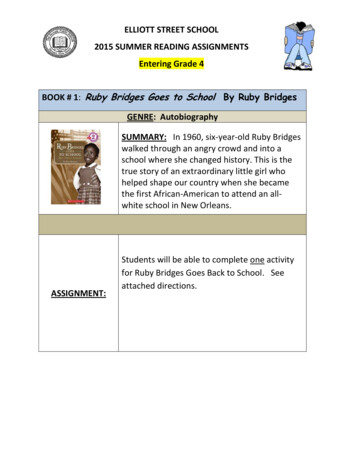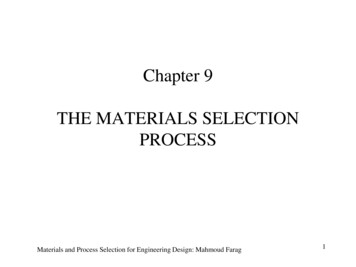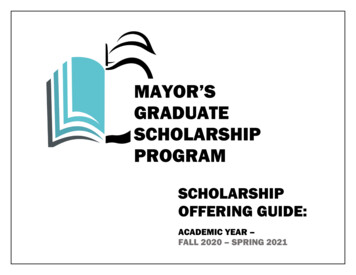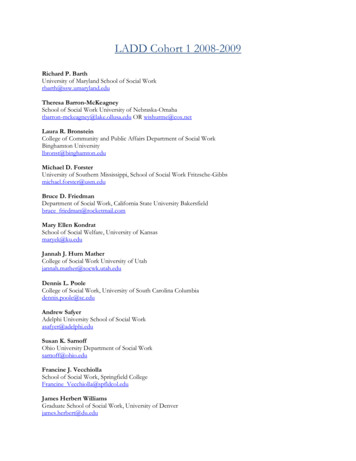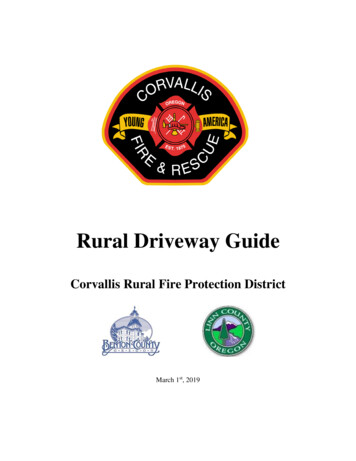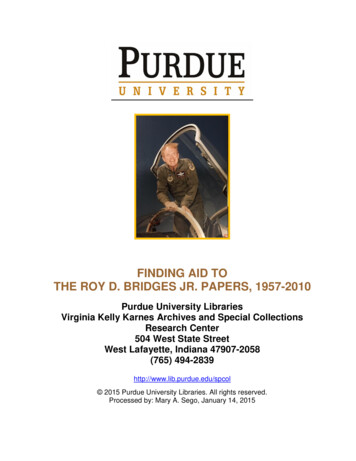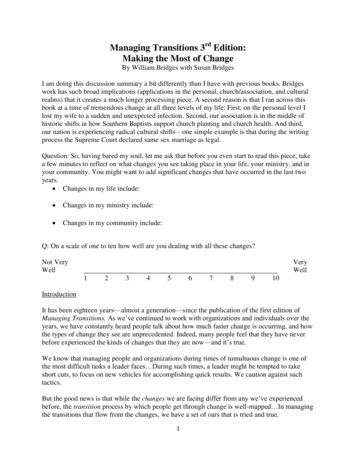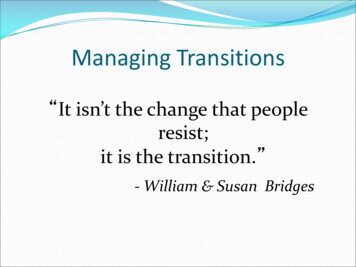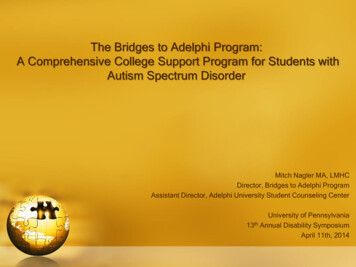
Transcription
The Bridges to Adelphi Program:A Comprehensive College Support Program for Students withAutism Spectrum DisorderMitch Nagler MA, LMHCDirector, Bridges to Adelphi ProgramAssistant Director, Adelphi University Student Counseling CenterUniversity of Pennsylvania13th Annual Disability SymposiumApril 11th, 2014
While there are no clear answers to the enigma of Asperger Syndrome, there areunexpected treasuresJesse Saperstein,Atypical Life With Asperger’s in 20 1/3 Chapters
Bridges to Adelphi Program The Bridges to Adelphi Program is designed to support Adelphi University studentswho self identify with diagnoses of Autism Spectrum Disorder (ASD), or other nonverbal learning disorders. The Bridges Program is offered through the Division of Student Affairs Began as a granted pilot project in 2007, funded by Jewish Child Care Association
Bridges to Adelphi Program Academic criteria for acceptance to the university must be met first No separate application or admittance process Fee for service program 75 Students 23 Staff
Autism Spectrum Disorder ASD is a complex pervasive developmental disorder resulting from a neurodevelopmental malfunction that affects normal functioning of the brain. Because ASD is a pervasive developmental disorder, it is different from a learningdisability in that it affects all areas of functioning including academic performance,social interactions, interpersonal communication, and executive functioning skills. Therefore, a college support program for students with ASD must take a pervasiveapproach ASD is a non-verbal learning disorder 70% of communication is non-verbal
Autism Spectrum Disorder DSM- V 1 in 88 There are never two people with ASD who are exactly the same. ASD is not mental illness The majority of people with ASD also struggle with anxiety and depression ASD is a life long problem ASD is often a “right brain” disability
High School vs College IDEA vs ADA IEP vs Accommodations Mandated vs Offered Self Advocacy Parental Involvement Faculty Expectations First time away from home
College Students on the Autism Spectrum Executive FunctioningFear of FailureIllogical/Distorted/Concrete ThinkingTheory of MindImpulse ControlAffect RegulationWorking MemoryProcessing Speed Communication SkillsSocial SkillsFamily DynamicsIndependent Living SkillsComorbid DiagnosesDenialPast History/PTSDTransitions
College Students on the Autism SpectrumCreative/Visual Thinkers May think in photographic imagesExcel in artsStruggle with math, languagesCareers in fine arts, drafting, photography, graphic design, jewelry designAs children they enjoy playing with building toys like LEGO’s
College Students on the Autism SpectrumVerbal Thinkers Think in word details.Excel in amassing large amounts of information and facts about specific subjectssuch as history, geography, foreign language, weather, stock market reports, andsports statistics.Struggle with drawing, math, abstract thinkingCareers in language translation, journalism, accounting, speech therapy, economics,library work, or financial analysisAs children, may remember and recite long strings of information
College Students on the Autism SpectrumPattern Thinkers Think in patternsExcel at music, math, foreign languages, and computer programming.Often see patterns and relationships between patterns and numbers instead ofthinking in picturesStruggle with written language, and verbal expressionCareers in computer programming, engineering, music, and physicsAs children they may play music by ear, and be interested in chess or video games
Automatic Negative ThinkingThese three circles are the core informationprocessing issues that are central to automaticnegative thinkingCircle 1 - “I’m no good”Circle 2 - “”I don’t understand others, and they don’tunderstand me”Circle 3 - “ I have failed before. I don’t want to failagain. Therefore, I am not going to do it” .This leadsto failure, which then acts as a self fulfillingprophecy .which leads back to Circle 1View ofSelfView oftheWorldView ofOthers
Helpful Techniques Identify what type of thinker this student is Create an accepting, calm, predictable environment 4C’s - clear, concise, concrete and consistent Avoid sarcasm, irony, double entendres Limit your questions and thoughts Natural consequences Never take it personally
Student # 1 Male - FreshmanFull scholarship, 800 on Math SATsPhysics/math major Pattern learnerConcrete thinker needs a ”logical” explanation behind everythingPoor EFDsPoor impulse control, Poor frustration tolerance, Poor affect regulationDoes not read social cues ToMImpulsivity leads to poor classroom behaviors .ToMDysgraphiaPoor transitioning skillsOCD» Lived on campus, now commutes» Mentor” in each class» Concrete and consistent rules and boundaries» ”3 strikes and you are out”» Internal vs. External thoughts» Student Counseling Center» Natural consequences
Student #2 Female – SeniorHonors studentOriginally political science major, now fine arts she is an “Artist”Creative thinker, writerPoor ToMStruggles with anxiety, depression, and ANT’sEmotionally labileProcrastination and avoidanceProcessing speedWent to a small private school from K – 12 where her mother workedLives on campus, dorms with a fellow female Bridges student» Identify triggers: Accepting others opinions, ANTs, andprocrastination , med management, diet, sleep» Student Counseling Center» Sketchbook» Vocational planning
Student #3 Male – FreshmanVerbal thinker720 Math SAT’s 660 Verbal SAT’s95 HS AverageMainstream NYC HS SchoolBio MajorDorming in singleMedicationsHS vs CollegePut out of several classes due to provocative behaviors Psychiatric/Psychologist consults Faculty involved Parents involved Natural consequences Consistency
Bridges to Adelphi Program Based on psychological principles of Cognitive Behavioral Therapy, Social LearningTheory, Person Centered Therapy / Unconditional Positive Regard, Temple Grandin Bridges strives to create an environment supportive of the intellectual, emotional, andspiritual needs of students Maximize areas of student strengths, encouraging creativity and self esteem Foster each student’s unique view of the world- “See the world through their eyes”- “Hear their music”- Try to be the first “To get them”- Build trust
Bridges to Adelphi Program All services are provided by current Adelphi graduate students studying:- Psychology- School Psychology- Education- Social Work- Speech and Communication Theory
Bridges to Adelphi Program Academic ServicesSocial ServicesVocational Services Reports and documentation
Bridges to Adelphi ProgramAcademic Coach Focus on executive functioning- Following syllabi- Planning work and assignments- Time management- Self care- Accessing academic accommodations Academic Coaches are interested in how students think about things
Bridges to Adelphi ProgramLearning Strategist Focus on assignment completion- Research- Editing assignments- Test preparation & studying Learning Strategists are interested in how students learn, and workAcademic Coaches and Learning Strategists collaborate
Bridges to Adelphi ProgramOther Academic Supports & Benefits Priority registrationDirector is academic adviserWith consent, contact with DSSWith consent, contact with facultyWith consent, contact with familyComputer/Math Coach
Bridges to Adelphi ProgramSocial Services Bridges office is open:- 8am - 8pm Monday - Friday- 9am – 4pm on Saturday Twice weekly open groups Weekly Women’s group Weekly Men’s group Monthly outings Peer mentoring
Bridges to Adelphi ProgramVocational Services Vocational testing Individual and group vocational counseling ACCES-VR On campus internships Off campus partnerships Post graduate vocational program partnerships
Bridges to Adelphi ProgramBenefits to the University University is responding to growing awareness and needPositive community regardStudents are an asset to the campusNon-tuition incomeRetentionDiversityUnique training opportunity for staffResearch
Bridges to Adelphi ProgramProgram Challenges GrowthSupport from upper administrationSpaceSupport from faculty and staffStaffingProfessional vs. Grad studentsTrainingPost graduation
Bridges to Adelphi ProgramPartnering with: Academic Provost Faculty Administrative Staff Student Counseling Center Disability Support Services Learning/Writing Center Admissions Residential Life Registrar Student Conduct Public Safety Conference Services
Bridges to Adelphi ProgramResearchLongitudinal study on the intercorrellations between, and differences over time Self-Esteem GPA Attendance RetentionIntercorrellations and differences between Alexithymia Emotion Regulation Difficulties Anxiety
Suggested ReadingsDeveloping College Skills in Students with Autism and Asperger SyndromeFreedmanCognitive Behavioral Therapy for Adult Asperger SyndromeGausThinking in Pictures: My Life with AutismGrandinSucceeding in College with Asperger SyndromeHarpur, Lawlor, and FitzgeraldATYPICAL Life With Asperger’s in 20 1/3 ChaptersSapersteinStudents with Asperger Syndrome: A Guide for College PersonnelWolf, Brown, Bork
Bridges to Adelphi Program The Bridges to Adelphi Program is designed to support Adelphi University students who self identify with diagnoses of Autism Spectrum Disorder (ASD), or other non-verbal learning disorders. The Bridges Program is offered through the Division of Student Affairs
